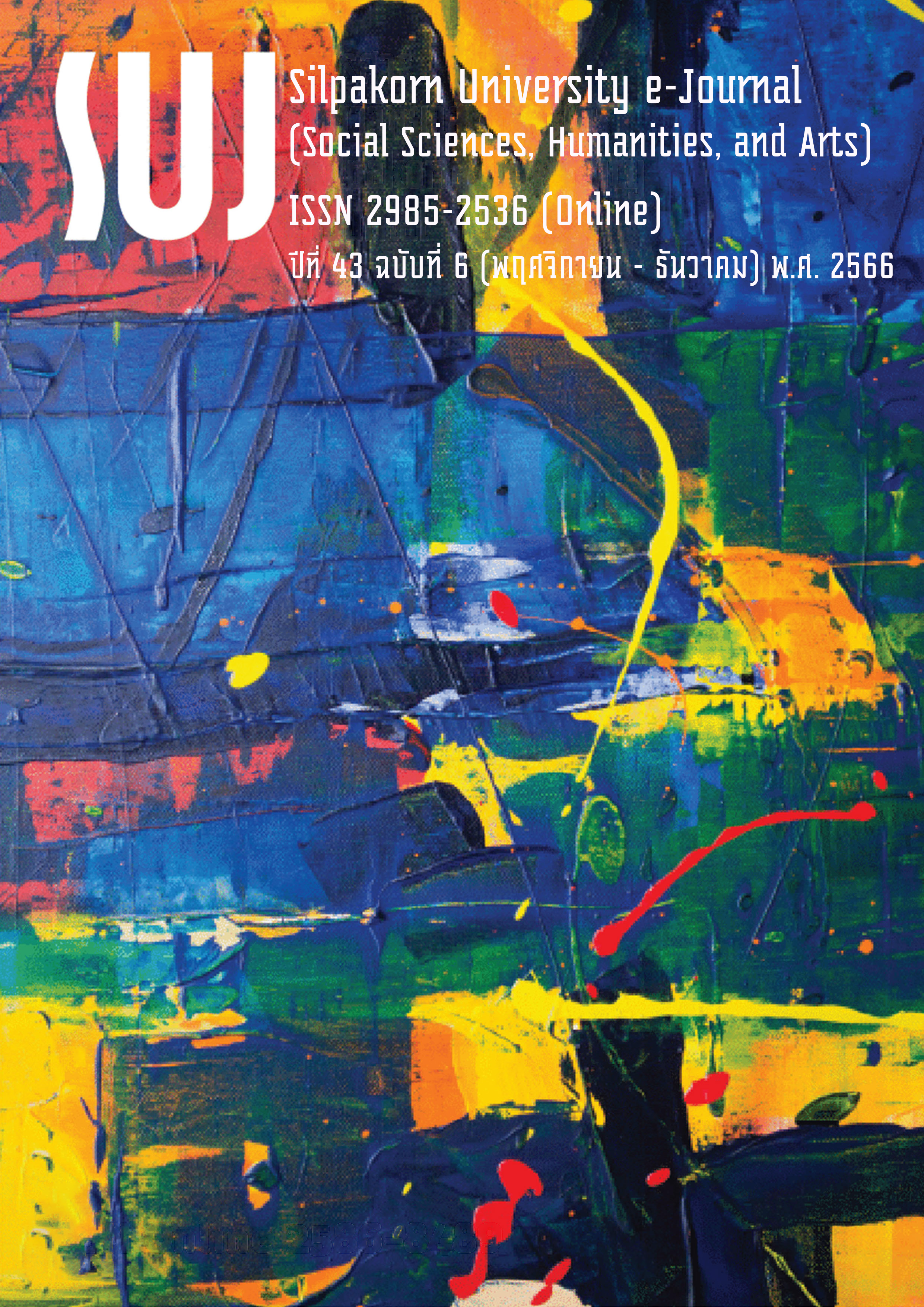การพัฒนาการขับร้องและการประพันธ์เพลงสำหรับเด็กของนักศึกษา โดยประยุกต์ใช้แนวคิดของโคดาย (The development of students’ singing and songwriting abilities for preschoolers by applying Kodaly Approach)
Main Article Content
Abstract
การวิจัยครั้งนี้มีวัตถุประสงค์เพื่อพัฒนาความสามารถทางการขับร้องและการประพันธ์เพลงสำหรับเด็กปฐมวัยของนักศึกษาสาขาการศึกษาปฐมวัย โดยการประยุกต์ใช้แนวคิดทางดนตรีของโคดาย ประชากรที่ใช้ในการวิจัย ได้แก่ นักศึกษาชายและหญิง ของมหาวิทยาลัยสวนดุสิต ระดับปริญญาตรี หลักสูตรศึกษาศาสตรบัณทิต สาขาวิชาการศึกษาปฐมวัย ชั้นปีที่ 2 ภาคเรียนที่ 2 ปีการศึกษา 2562 ตอนเรียน A1 จำนวน 31 คน เครื่องมือที่ใช้ในการทดลอง คือ 1) แผนการจัดกิจกรรมพัฒนาความสามารถทางการขับร้องและการประพันธ์เพลงสำหรับเด็กปฐมวัย 2) แบบทดสอบความสามารถทางการขับร้องและ 3) แบบทดสอบความสามารถทางการประพันธ์เพลงสำหรับเด็กปฐมวัย โดยการทดสอบปฏิบัติการขับร้องและการประพันธ์เพลง วิเคราะห์ค่าเฉลี่ยประชากร (μ) ค่าส่วนเบี่ยงเบนมาตรฐานประชากร (σ) ผลการวิจัยพบว่า นักศึกษาหลังการทดลองมีความสามารถทางการขับร้อง ด้านคุณภาพของเสียง ด้านการใช้ระดับเสียงตามทำนองและจังหวะ และด้านการถ่ายทอดอารมณ์ตามบทเพลง สูงขึ้นกว่าก่อนการทดลอง โดยคะแนนเฉลี่ยรวมก่อนการทดลองมีค่าเฉลี่ย เท่ากับ 1.99 (σ = 0.70) อยู่ในระดับปานกลาง และหลังการทดลองมีค่าเฉลี่ย เท่ากับ 2.96 (σ = 0.78) อยู่ในระดับดีมาก รวมทั้งมีความสามารถทางการประพันธ์เพลงสำหรับเด็กปฐมวัย ในด้านการใช้ภาษาและอักขระ ด้านการใช้ระดับเสียงตามทำนองและจังหวะ ตลอดจนในด้านการถ่ายทอดเนื้อหาสาระ ความรู้ ตามหน่วยจัดประสบการณ์การเรียนรู้ สูงขึ้นกว่าก่อนการทดลอง โดยคะแนนเฉลี่ยรวม ก่อนการทดลองมีค่าเฉลี่ย เท่ากับ 1.96 (σ = 0.52) อยู่ในระดับปานกลาง และหลังการทดลองมีค่าเฉลี่ย เท่ากับ 2.85 (σ = 0.61) อยู่ในระดับดีมาก งานวิจัยนี้สามารถนำไปต่อยอดในการพัฒนาทักษะทางดนตรีในด้านอื่น ๆ โดยครูปฐมวัยนำไปประยุกต์ใช้ในการจัดกิจกรรมให้กับเด็กปฐมวัยได้
This research aimed to develop the singing and songwriting abilities of second-year undergraduate students majoring in early childhood education, applying the musical concepts of Kodaly for preschool children. The study population included 31 male and female second-year undergraduate students who majored in early childhood education, Faculty of Education, Suan Dusit University, during the second semester of the 2019 academic year, in the A1 class. The research tools were 1) activity development plans for enhancing the ability of singing and composing music for preschoolers, 2) singing ability tests, and 3) songwriting ability tests. The research analysis used mean (μ) and standard deviation (σ). The results showed an improvement in singing ability across 3 areas after the experiment: 1) tone quality 2) pitch and rhythm, and 3) conveying emotions in songs. The mean score for all 3 areas before the experiment was 1.99 (σ = 0.78), indicating a moderate level. After the experiment, the mean score increased to 2.96 (σ = 0.78), signifying a high level. In terms of students’ songwriting ability for preschool children, improvements were observed in language and character usage, pitch and rhythm utilization, and content and knowledge transfer according to the learning unit. The mean score for all 3 areas before the experiment was 1.96 (σ = 0.52), signifying a moderate level. After the experiment, the mean score increased to 2.85 (σ = 0.61), suggesting a high level. This research can be applied by early childhood teachers to foster music skills in various areas when organizing activities for preschool children.
Downloads
Article Details

This work is licensed under a Creative Commons Attribution-NonCommercial-NoDerivatives 4.0 International License.
References
Assawaweeradej, Sukridya, & Suttachitt, Narutt. (2020). Development of inner hearing lesson plans for note reading based on Kodály’s approach for early piano students (การพัฒนาแผนการจัดการเรียนรู้เรื่องการได้ยินภายในสำหรับการอ่านโน้ตตามแนวคิดโคดายสำหรับนักเรียนเปียโนระดับชั้นต้น). An Online Journal of Education, 15(2): OJED-15-02-027.
Banomyong Boontasanakul, Dusadee. (2004). Making Dreams with Music, Let’s Practice Singing (สานฝันด้วยเสียงเพลง มาฝึกร้องเพลงกันเถิด) (4th ed.). Bangkok: V. Print (1991).
Buasri, Phatthiya. (2013). Analysis of Song and Rhyme Usage of Preschool Teachers (การวิเคราะห์การใช้เพลงและคำคล้องจองของครูอนุบาล). Master’s dissertation, Chulalongkorn University, Bangkok, Thailand.
Chutikorn, La-or. (2006). Songs and Music for Preschoolers (เพลงและดนตรีสำหรับเด็กปฐมวัย). In Literature and Dramatization for Early Childhood Education, Units 8-15 (เอกสารการสอนชุดวิชา วรรณกรรมและลีลาคดี ระดับปฐมวัยศึกษา หน่วยที่ 8-15). Nonthaburi: The Office of the University Press Sukhothai Thammathirat Open University.
Jujaroen, Warangkana. (2018). The Development of Critical Thinking Abilities and Singing Skills Using Inquiry-Based Learning together with the Concept of Kodaly for Mathayom Suksa 3 Students (การพัฒนาความสามารถในการคิดอย่างมีวิจารณญาณและทักษะการขับร้อง โดยใช้การจัดการเรียนรู้แบบสืบเสาะหาความรู้ร่วมกับแนวคิดของโคดาย สำหรับนักเรียนชั้นมัธยมศึกษาปีที่ 3). Master’s dissertation, Dhurakij Pundit University, Bangkok, Thailand.
Koatsombat, Arunee (Ed.). (2018). Basic Music Skills for Teacher (เอกสารประกอบการเรียนทักษะทางดนตรีพื้นฐานสำหรับครู). Bangkok: Graphic Site.
Komkhum, Nuntirat. (1995). A Study of Song Usage in Preschool Instruction (การศึกษาการใช้เพลงในการเรียนการสอนเด็กวัยอนุบาล). Master’s dissertation, Chulalongkorn University, Bangkok, Thailand.
Office of the Basic Education Commission, Ministry of Education. (2017). The 2017 Early Childhood Curriculum B.E. 2560 (หลักสูตรการศึกษาปฐมวัย พุทธศักราช 2560). Bangkok: The Agricultural Co-operative Federation of Thailand Printing House.
Office of the Education Council, Ministry of Education. (2017). The National Education Plan B.E. 2560-2579 (แผนการศึกษาแห่งชาติ พ.ศ. 2560-2579). Bangkok: Prikwan Graphic.
Sakalpasak, Warunee, & Halathaingam, Wannaapa. (2019). Music and movement activity for early childhood (ดนตรีและกิจกรรมเคลื่อนไหวสำหรับเด็กปฐมวัย). Vajira Medical Journal: Journal of Urban Medicine, 63(3): 203-208.
Suttachitt, Narutt (Tran.). (1994). Kodály’s Principles in Practice: An Approach to Music Education through the Kodály Method (หลักการของโคดายสู่การปฏิบัติ: วิธีการด้านดนตรีศึกษาโดยการสอนแบบโคดาย). Bangkok: Chulalongkorn University Press.
Suttachitt, Narutt. (2001). Music Teaching Behavior (พฤติกรรมการสอนดนตรี) (3rd ed.). Bangkok: Chulalongkorn University Press.
Suttachitt, Narutt. (2018). Music Studies Principles and Knowledge (ดนตรีศึกษา: หลักการและสาระสำคัญ) (10th ed.). Bangkok: Chulalongkorn University Press.
Wannarun, Wannawut. (2010). The Effect of Music Activity Technique of Kodaly on Music Skill of Mathayom Suksa VI Students at Watsongtham School in Praprhadaeng District, Samutprakran Province (ผลของการใช้กิจกรรมดนตรีตามแนวคิดของโคไดที่มีต่อทักษะทางดนตรีของนักเรียนชั้นมัธยมศึกษาปีที่ 6 โรงเรียนวัดทรงธรรม อำเภอพระประแดง จังหวัดสมุทรปราการ). Master’s dissertation, Srinakharinwirot University, Bangkok, Thailand.
Wasi, Prawase. (2002). The Way of Mankind in the 21st Century to a New World of Development (วิถีมนุษย์ในศตวรรษที่ 21 สู่ภพภูมิใหม่แห่งการพัฒนา) (3rd ed.). Bangkok: Sodsri-Saritwong Foundation.
Wimonrattanakul, Wimonrat. (2004). A Development of Preschool Teachers’ Singing Ability Enhancement Program with Regard to Preschoolers’ Learning Experience Provision by Applying Kodaly Approach (การพัฒนาโปรแกรมการส่งเสริมความสามารถทางการขับร้องของครูปฐมวัยในการจัดประสบการณ์การเรียนรู้ให้เด็กอนุบาลโดยการประยุกต์ใช้แนวคิดทางดนตรีของโคดาย). Master’s dissertation, Chulalongkorn University, Bangkok, Thailand.


